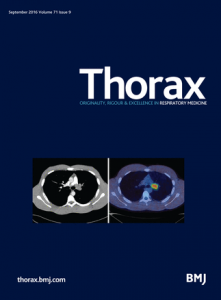It’s not often that a paper elicits an apology — but that’s just what happened when family members first learned a bagpipe musician died from inhaling mold and fungi from a case study reported in a journal. The hospital has since apologized; the journal, however, told us it is not planning to issue a retraction.
The University Hospital of South Manchester NHS Foundation Trust in Wythenshawe, UK, has apologized and launched an internal investigation into the case report after the family’s distress was extensively covered by the UK’s mainstream media, such as The BBC, The Independent, The Daily Mail, and The Telegraph.
There seem to be conflicting accounts over whether any consent was obtained to publish the report. The Thorax paper says the patient gave consent, and according to Gisli Jenkins, co-editor-in-chief of the journal and a professor of experimental medicine at Nottingham University in the UK, consent was sought from the family. But the patient’s daughter told us that neither the next of kin nor the patient were approached for consent.
The release of the report on August 22 was “completely unethical,” said Erin Tabinor, daughter of musician Bruce Campbell and a makeup artist in Liverpool, UK. Tabinor told us that the family wasn’t aware that playing bagpipes was the cause of Campbell’s death:
We were told he had a fatal condition called Pulmonary Fibrosis and a heart condition had caused his death. To say we are shocked is an understatement.
She added that the article now makes his cause of death clear to the world:
Enough information was contained within that report to positively identify my father to [anyone] who knew him…
Tabinor, who was formerly a practicing lawyer, added:
We weren’t even contacted once by the hospital to let us know about the existence of this report.
Thorax editor Jenkins sent us this statement:
We are not considering a retraction in this instance. It is BMJ policy that family consent is always sought. This particular case was no exception.
Tabinor agreed, noting that retracting the article now would be “ridiculous.”
Nazia Chaudhuri, consultant respiratory physician and a senior lecturer at the University of Manchester, UK and the case report’s last author, declined to comment on the case, citing the ongoing investigation. Chaudhuri, nevertheless, referred us to Thorax’s “requirements and specifications” for case reports, which states:
Authors must indicate that they have obtained patient consent.
The report also states that patient consent was obtained.
A press release from the journal at the time of the report’s publication says:
Hypersensitivity pneumonitis is triggered by the immune system’s response to an inhaled environmental antigen and can progress to disabling or fatal lung disease. It is often associated with occupational exposure to birds, particularly pigeons. But in a significant proportion of cases, it’s not always clear what has triggered it.
It goes on to note:
This is an isolated case, and the cause of the man’s condition was not definitively proved. But there have been other reported cases of hypersensitivity pneumonitis, arising in trombone and saxophone players…
This isn’t the first case report to cause distress to the family of the deceased: In 2014, the authors and journal apologized to parents for writing about a child who died during anesthesia, and earlier this year, a son asked a journal to retract a report after seeing it had mistakenly published images of his deceased father’s surgery following a mixup with another patient.
Like Retraction Watch? Consider making a tax-deductible contribution to support our growth. You can also follow us on Twitter, like us on Facebook, add us to your RSS reader, sign up on our homepage for an email every time there’s a new post, or subscribe to our daily digest. Click here to review our Comments Policy. For a sneak peek at what we’re working on, click here.

Either informed consent was 1) approved by an Institutional Review Board, 2) administered by a trained consenter who was registered with the IRB) and 3) written/signed by the patient or authorized representative or it was not.
I agree with rfg. Consent is a piece of paper – it either exists or it does not; at least this much should be easy to verify. That being said, there are somewhat different forms of consent and for patients it is not immediately obvious that that a case report of their case will be published. Several institutions I am familiar with (in the USA) provide a separate form to a patient that specifically requests permission for publication and it is different from a consent to perform study.